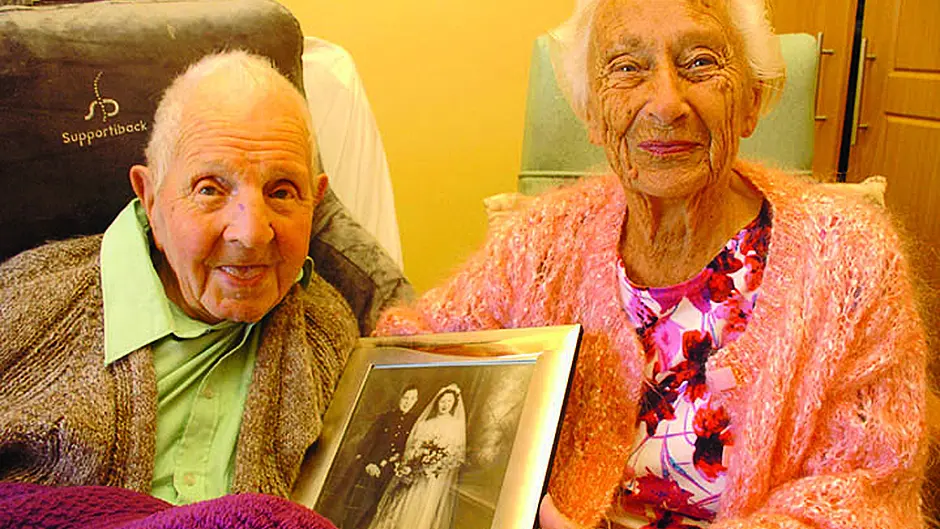Jackie Keogh meets a wonderful woman who, at 94, recalls the highs and lows of her colourful life, and the challenges of caring for her husband, Alfred, who is ready to celebrate his 100th birthday
Jackie Keogh meets a wonderful woman who, at 94, recalls the highs and lows of her colourful life, and the challenges of caring for her husband, Alfred, who is ready to celebrate his 100th birthday
After 74 years of marriage, Beatrice Waldron said her kind, thoughtful husband has turned into a foul-mouthed fiend.
Beatrice (94) is not being unkind, nor does she want to sully the reputation of a man that she has loved since she was a slip of a girl, aged 18.
What she means when she says ‘a fiend has taken over his body’ is that he has dementia and that it is not the frail, fairytale version.
Beatrice, who is both cheery and articulate, said: ‘I am very grateful that I have kept my sanity under these difficult circumstances. Dementia is horrific: every minute is a nightmare because a person can change at the snap of a finger.’
Alfred Victor Waldron was born on September 15th 1918 into a family with good principles, such as never swearing in front of a lady, and on September 15th his 100th birthday will be celebrated at his new place of residence at Skibbereen Nursing Home.
A stone’s throw from the nursing home is Beatrice’s compact cottage, which is as neat, trim and attractive as its owner.
How Beatrice and Alfred came to live in Skibbereen is a story in itself because when he became too unwell to care for at home both Beatrice and her daughter, Marion, surfed the net looking for suitable accommodation.
When they came to Skibbereen, Beatrice said they knew it was an instant thumbs up: The vibe was just right.
‘When we went through the door, I braced myself for my nostrils to be assailed,’ said Beatrice, ‘but there was no need: the reception hall was light and airy, some patients were seated in comfortable chairs, or their particular wheelchair. Some of the ladies wore make-up, as well as having their fingernails lacquered, and they were nicely dressed. The men, too, were freshly washed and shaved and were very neat and tidy.
‘In the days that followed, I witnessed every room being cleaned each and every day. Soiled laundry was collected each day, washed, dried and pressed and beautifully folded and returned to the patient the next day.
‘Patients’ needs were paramount. And never once did any member of the staff raise his or her voice.’
Beatrice is the sort of lady you could sit and listen to for hours. She is interesting on every subject – from her days volunteering during the war as a member of the Auxiliary Territorial Service, which was the women’s branch of the British Army during the Second World War, to the state of the health care system. She is interesting, too, on the subjects of aging, living and dying.
Today she is talking about the elderly caring for the elderly, which is what she had to do until she and Alfred relocated to Skibbereen from their Irish home in Banteer in 2016.
Since their marriage in March 1944, they had lived in Middlesbrough, Yorkshire, where Alfred was a buyer in the purchasing department of a major steelworks. But when he took early retirement they moved to Devon, only to relocate in 1990 to Ireland, after their daughter married an Irishman.
It was in the year 2002 that Alfred had an operation for a total knee replacement but went into a coma afterwards.
‘He emerged from that unable to walk, talk, and operate as normal,’ said Beatrice, who responded by literally and figuratively rolling up her sleeves, devising ways of bringing him back to reality.
Mind games, scrabble, and physical exercises were just some of the tools she used and fortunately – with true Yorkshire grit – he proved to be a good patient and his quality of life improved.
‘It was a struggle because I had to teach him the basics of living,’ said Beatrice.
All was well, for a time, but over the next 14 years, Beatrice said she noticed how Alfred started to deteriorate. ‘It was nothing much at first: just little puzzling incidents.’
His GP sent him for tests and it was confirmed that Alfred had dementia and other related brain diseases and there was no other recourse but to find him a permanent place in a nursing home.
‘It was a severe blow,’ she said, ‘but at 92 I had no option but to concur.’ Today, Beatrice is happy that Alfred has good, secure accommodation and she likes her own house too, saying: ‘It’s small but I wouldn’t want to rattle around a large house.’
Here, Beatrice can cross the road within the nursing home compound to visit Alfred, but sometimes she finds these visits upsetting. ‘His favourite expression is to tell everyone to f*** off. Before he developed dementia, he had never uttered that word in front of me.’
What is upsetting, too, is that he looks at her, the lines on her face and thinks that she is his mother, not his former lover. And he cannot comprehend how Marion – a lady in her 70s – could be his daughter.
Beatrice said you can’t argue with someone who has dementia, and, in that respect, she is resigned. But there is more to her stoicism that the proverbial stiff upper lip. She understands life, its twists and its turns.
She knows, too, how good her health is, and, in terms of her sunny disposition and outlook, Beatrice said: ‘It’s the luck of the draw. I had a good job and I had a full life.’
She added: ‘At the age of 94, I have done all the crochet, knitting and needlework I am ever going to do. Now, I do whatever I want to do. Now, it is time to please myself.’








